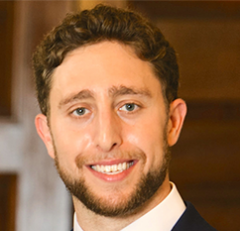
The International Biomedical Research Alliance introduced two new recognition awards designed to honor the achievements of alumni and newly-graduated students of the NIH Oxford-Cambridge Scholars Program. The ceremony to honor the winners was held during the 2020 NIH Global Doctoral Partnerships Research Workshop June 15th-18th.
Dr. Danielle Bassett, J. Peter Skirkanich Professor, Bioengineering (BE), Electrical and Systems Engineering (ESE) at the University of Pennsylvania, was awarded the Distinguished Alumni Award which recognizes achievement of an exceptional nature in scientific and medical inquiry, professional practice, and enhancing the lives of others both personally and professionally. This Award is not given in recognition of a single remarkable achievement but is reserved for an NIH-OxCam alumni who has attained and maintained extraordinary impact throughout their career in their chosen fields of endeavor and in their service to society at large. Dr. Bassett completed her PhD in 2009 from Cambridge University. Her mentors were Daniel Weinberger and Ed Bullmore.
Dr. Bassett is well known for her work blending neural and systems engineering to identify fundamental mechanisms of cognition and disease in human brain networks. Her journey to academia was extremely unique as detailed in a feature article published in Science magazine (https://science.sciencemag.org/content/364/6436/118). She is the recipient of multiple prestigious awards, including a MacArthur Fellow Genius Grant in 2014. She is the author of more than 290 peer-reviewed publications, which have garnered over 22,000 citations (h-index 63), as well as numerous book chapters and teaching materials. She is the founding director of the Penn Network Visualization Program, a combined undergraduate art internship and K-12 outreach program bridging network science and the visual arts.
Dr. Bassett is committed to extending her work beyond the sphere of academia and into the lives of the community, including presenting her work to middle school, high school, and college youth students. Dr. Bassett is also deeply committed to enhancing and supporting diversity in science. She has been involved in organizations supporting women in STEM since her time as an undergraduate. Since arriving at Penn, she spent 5 years as the Faculty Co-advisor for Society of Women Engineers. She has also given talks and engaged in discussions at many events advancing women in science. She is currently spearheading efforts in Penn’s School of Engineering to support LGBTQ+ graduate students, and serves as a formal point-of-contact for graduate students who would like to discuss issues of diversity or climate in Penn’s Department of Bioengineering specifically and School of Engineering & Applied Science broadly. More recently, Bassett has begun contributing to the scholarly study of gender and racial disparity in academia, and developing tools to mitigate that disparity. The work began with a study of “The extent and drivers of gender imbalance in neuroscience reference lists”, now in press at Nature Neuroscience (2020; Preprint available here https://arxiv.org/abs/2001.01002). Dr. Bassett’s laboratory has proven to be an excellent training ground for new scientists. Eleven graduate students or postdocs for whom Dr. Bassett has served as either primary or secondary mentor have been placed in faculty positions. Eleven graduate students have received their PhDs and have been placed in prestigious postdoc fellowships including positions at Princeton University, University College London, and University of California San Francisco.

The International Biomedical Research Alliance introduced two new recognition awards designed to honor the achievements of alumni and newly-graduated students of the NIH Oxford-Cambridge Scholars Program. The ceremony to honor the winners was held during the 2020 NIH Global Doctoral Partnerships Research Workshop June 15th-18th.
The 2020 Outstanding Recent Graduate Award was bestowed upon Dr. Jakob Seidlitz, a postdoctoral researcher at the University of Pennsylvania and Co-Founder of Cooperative Open Science Network (COSciN), aiming to bridge the gap between academia and industry. The Outstanding Recent Graduate Award recognizes the noteworthy and distinctive achievements of an individual who has graduated from the NIH Oxford-Cambridge Scholars program within the last two years. The honoree embodies the values of scientific innovation and collaboration leading to seminal biomedical discoveries at an early stage in their career.
Dr. Seidlitz was also the recipient of the 2018 IBRA Innovation Award for novel solutions in biology or medicine for discoveries of unusual importance, application, or magnitude that make use of new or unusual methods, paradigms or approaches to solve important problems in biology or medicine. Dr. Seidlitz’s work focused on adolescence — a time of major physical, chemical, and biological changes, as well as a common period of onset for various brain-related disorders. It is crucial to develop methods that help achieve a full understanding of normative neurodevelopment, allowing better characterization of aberrant neurodevelopment. His work is focused on providing such an understanding through the use of brain networks generated from multimodal neuroimaging. He is looking at new ways to integrate multiple MRI contrasts in order to create a brain network “fingerprint” for an individual. In theory, these methods will be more robust to capturing an individual’s neurobiological profile, and thus more sensitive to inter-individual differences in behavior, cognition, and psychopathology. Dr. Seidlitz’s work was published in Neuron, with a related publication co-lead by another OxCam student in Science.
“I was delighted and humbled to receive the inaugural Outstanding Recent Graduate Award. My PhD, and the work being recognized herein, is representative of what makes the OxCam program so unique – the support and freedom to pursue curious and collaborative science. A big thanks to the directors and staff for this recognition, and for making the program what it was for me and what it is today,” remarked Dr. Seidlitz.
Dr. Seidlitz’s postdoctoral fellowship finds him collaborating with another NIH OxCam alumnus, Dr. Aaron Alexander-Bloch. Under a T32 training grant at the University of Pennsylvania and Children’s Hospital of Philadelphia, they are working on imaging-genetic and imaging-transcriptomic methods and applications with a focus on development and neuropsychiatric disease. A graduate of the University of Rochester, Dr. Seidlitz received his PhD from the University of Cambridge in 2019 as a Scholar in the prestigious NIH Oxford-Cambridge Scholars Program under Dr. Armin Raznahan (NIMH/(NIH) and Prof. Ed Bullmore (Cambridge).

Published: Monday, September 28, 2020 – http://www.biohealthinnovation.org/biohealth-news/biohealth-regional-news/11971-biohealth-innovation-award?utm_source=biohealth-innovation-news&utm_medium=gazetty&utm_campaign=09-28-2020
First awarded in 2016, the International Biomedical Research Alliance’s Innovation Award recognizes novel solutions in biology or medicine and acknowledges discoveries of unusual importance, application, or magnitude that make use of new or unusual methods, paradigms, or approaches to solve important problems in biology or medicine. This year, the Innovation Award was graciously sponsored by BioHealth Innovation Inc. and presented to Michael Metrick. A graduate of James Madison University, Michael is working toward completion of his PhD in the NIH Oxford-Cambridge Scholars Program. The Scholars Program is a novel, dual-mentored, and international collaboration between the National Institutes of Health (NIH) in Bethesda, Maryland and the Universities of Oxford and Cambridge, respectively, in the United Kingdom. The Scholars Program’s elite students conduct their own biomedical research project in an average completion time of 4.2 years. Michael is in the MD/PhD track and his MD is in progress at the University of Illinois at Chicago. Michael is mentored by Prof. Byron Caughey at the NIH’s National Heart Lung and Blood Institute (NHLBI) Rocky Mountain Laboratory in Hamilton, Montana and Prof. Michele Vendruscolo at the University of Cambridge.
“I couldn’t believe it when I heard my name announced at the 2020 NIH Global Doctoral Partnerships Research Workshop Awards Ceremony,” Michael stated. “It wasn’t until I received messages from my peers congratulating me that it sunk in! My thesis project is basic science oriented and draws on many fundamental chemical and physical principles to better understand biology. It means a lot to me to have this sort of basic science work recognized. I hope it also encourages others who might feel overshadowed by the more abundant biological and translational type of work. I’m incredibly grateful for the opportunity to conduct this work in labs that allowed me to freely pursue my ideas, which I recognize as a rare privilege that I’m trying to make the most of. Thank you, BioHealth Innovation, for sponsoring this award.”
Recently, the self-propagating nature of prions has been leveraged to develop ultrasensitive biomarker assays (called RT-QuIC) that allow accurate antemortem diagnosis of prion diseases. By exploiting these advances, Michael has adapted the RT-QuIC to study tauopathies and synucleinopathies. He proposed and executed systematic analyses of multiple factors that control the performance of multiple types of RT-QuIC assays for pathological aggregates of tau and α-synuclein in biospecimens. This work markedly improved the analytical sensitivities and specificities of key assays, including those for Alzheimer’s, Pick’s, progressive supranuclear palsy, and Creutzfeldt-Jakob disease in humans, and chronic wasting disease in cervids. Michael innovated the use of FTIR spectroscopy of tau RT-QuIC products to differentiate distinct disease-associated conformers, or strains, of tau aggregates. As a result of this work, Michael has developed an additional project, which is focused on dissecting the physical underpinnings of how amyloid proteins aggregate to form distinct conformations that give rise to different diseases. “We’re hoping that this methodology can accelerate this analysis by several months’ time, which can allow us to more quickly identify and analyze different small molecule inhibitors of the tau amyloid aggregation process in vitro,” said Michael.
Richard Bendis, BioHealth Innovation Inc.’s Founder, President and CEO stated “Michael is the type of talented early career scientist that our regional ecosystem needs. We were proud to sponsor this year’s Innovation Award for a deserving student in the NIH Oxford-Cambridge Scholars Program.”
About BioHealth Innovation, Inc.
BioHealth Innovation, Inc., is a regional innovation intermediary which supports the transformation of research projects into new business opportunities in partnership with the region’s rich assets, institutions, and entrepreneurial community. BHI achieves this goal by being a catalytic partner in the economic development ecosystem. Learn more at www.biohealthinnovation.org.
About NIH Oxford-Cambridge Scholars Program
Created in 2001, the NIH Oxford-Cambridge Scholars Program is a collaboration between the NIH and the universities of Oxford and Cambridge to revolutionize the way in which the most talented biomedical PhD and MD/PhD students are trained. Participants in the program receive accelerated training and work on their own collaborative research project to address critical biomedical research problems. Trainees graduate in an average of 4.2 years with a PhD degree. To learn more visit www.oxcam.gpp.nih.go
About the International Biomedical Research Alliance
Founded in 2005, The Alliance’s mission is to support the NIH Oxford-Cambridge Scholars Program and associated global PhD and MD/PhD training programs based in the Intramural Research Program of the NIH, America’s largest biomedical research organization. Our goal is to assure the financial viability and scientific excellence of the Scholars Program by supplementing government funding. The Alliance supports events, awards, and career developed initiatives designed to enrich the Scholars Program and broaden the perspectives of its students as they train to become the next leaders in biomedical research. For more information, please visit www.ibra.org.

The Dr. Richard and Vera Siegel Translational Award was generously endowed by NIH MD/PhD Partnership Program co-founder, Dr. Richard Siegel and his wife, Vera. First awarded in 2016, this annual award recognizes advances in the field of medical science that move fundamental discoveries from the bench to the bedside. The recipient of the Translational Award in 2020 was NIH-Cambridge Scholar Maggie Westwater. Maggie is mentored by Prof. Paul Fletcher at the University of Cambridge and Drs. Christian Grillon and Monique Ernst at the NIH’s National Institute for Mental Health.
Maggie has achieved an extraordinary feat in carrying out a unique and very challenging study examining how cognitive, neural, metabolic and endocrine factors come together to shape eating patterns and psychopathology in the most serious eating disorders: Anorexia Nervosa (AN) and Bulimia Nervosa (BN). She conceived and conducted one of the largest studies of this kind in this field. The primary findings from this work, identifying distinct hormonal responses to stress in AN and BN, have just been accepted for publication in one of the major international psychiatry journals, and her complementary neuroimaging work, which examined a prominent theory that psychological stress reduces our capacity for self-control, is currently under review. The successful completion of this work represents an outstanding accomplishment of clinical research and the insights emerging from the analysis will have important and far-reaching consequences. Here is the link to Maggie’s publication.
“I was very touched and honored to have been awarded the Dr. Richard and Vera Siegel Translational Award at the 2020 NIH Global Doctoral Partnerships Annual Workshop Awards Ceremony. My doctoral work has been driven by a desire to develop clinically-translational insights into the mechanisms of severe eating disorders, which have one of the highest mortality rates of all mental illnesses. I am beyond grateful to the program, my mentors, and my colleagues for their support of this work, as well as to Dr. Richard and Vera Siegal for generously supporting this prize.”
Maggie will be completing her PhD viva this Autumn, and following this, she plans to apply for independent funding for her postdoctoral research, which will use high-field, 7 Tesla neuroimaging to characterize homeostatic influences on decision-making processes in anorexia nervosa.

The Gregory Paul Lenardo Basic Science Award was graciously endowed by NIH OxCam Scholars Program co-founder, Dr. Michael Lenardo, in loving memory of his brother. First awarded in 2016, this annual award recognizes discoveries of fundamental cellular, molecular, or genetic processes using model systems that advance scientific understanding of biological processes in higher organisms. This year at the virtual Annual Research Workshop, the recipient of the Gregory Paul Lenardo Basic Science Award was NIH-John Innes Centre/WT Scholar Shannon McKie. Shannon is mentored by Prof. Tony Maxwell at the John Innes Centre and Dr. Keir Neuman of the NIH’s National Heart Lung and Blood Institute (NHLBI).
Shannon characterized DNA topoisomerase VI (topo VI), a recently-discovered topoisomerase of archaeal origin that has vital, largely-unknown roles in plants and plasmodial parasites. She purified topo VI and revealed new aspects of this enzyme through biochemical experiments. Shannon mastered single-molecule approaches, applying them for the first time to study topo VI. Her discovery elucidated the mechanism underpinning, that topo VI is a preferential decatenase, supporting its proposed role in endoreduplication in plants and suggesting possible functions in plasmodial parasites. Shannon also developed a novel method for mapping/sequencing topoisomerase cleavage sites, and how they are altered by DNA topology and clinically-important topoisomerase inhibitors.
“When I heard my name announced at the 2020 Workshop Awards Ceremony, I was in shock. Seeing my doctoral work recognized by not only my supervisors, but also by one of the founders of the NIH OxCam Scholars Program, Dr. Lenardo, was incredible. My statuette has already been placed in a special location, and I’m very proud to have been a part of this excellent PhD scholarship program. I am grateful for my mentors, friends, and family who have supported me through this journey and am honored to be named the Gregory Paul Lenardo Basic Science Award recipient of 2020,” stated Shannon.
Having just passed her viva (August 13th 2020), Shannon is currently involved in a short-term postdoc project characterizing protein that interact with DNA gyrase from Mycobacterium tuberculosis, such Mfpa and MurI. Her hope is to progress to long-term molecular biology postdoc where she will continue to refine her skills and knowledge in the characterization of proteins, hopefully ones of eukaryotic origin.





